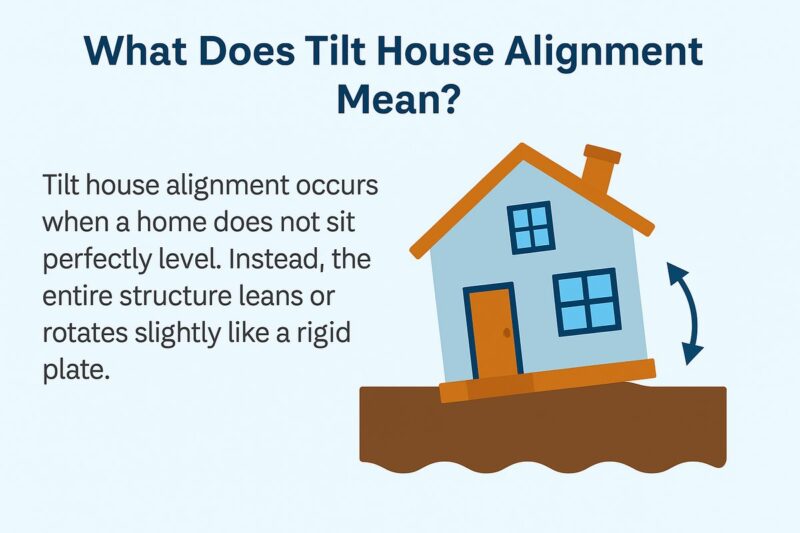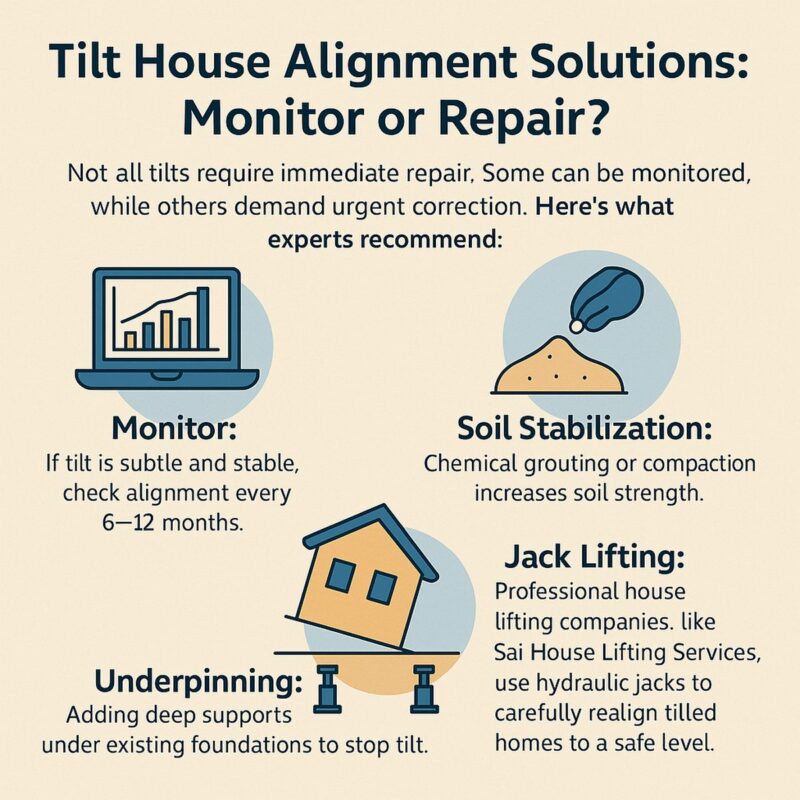
Tilt House Alignment in India: Causes, Fixes & Expert Guide
For example, A tilt house alignment occurs when a home’s foundation or structure rotates slightly, therefore creating leaning floors or walls. This results from soil settlement being slow, poor foundation. It often results from soil settlement, slope, or poor foundation design. Tilt beyond 1/100 (~0.57°) requires professional evaluation and possible realignment services like Sai House Lifting.
Tilt House Alignment: Table of Contents
- What Does Tilt House Alignment Mean?
- Why Houses Tilt: Real Causes in India
- How to Spot the Tilt: Simple Tests & Signs
- How Much Tilt Is Acceptable? Engineering Thresholds
- Tilt House Alignment Solutions: Monitor or Repair?
- Local Insights: Why It Matters in India
- Real Story: A Tilted Homeowner Experience
- Comparison Table: DIY vs Professional Evaluation
- Data Table: Tilt Thresholds, Risk & Action
- FAQs on Tilt House Alignment
- Conclusion & Sai House Lifting CTA

What Does Tilt House Alignment Mean?
In simple terms, tilt house alignment refers to the condition where a home does not sit perfectly level. Instead of uniform settlement, the entire structure leans or rotates slightly like a rigid plate. Unlike cracking (distortion), tilt is a rotation of the structure.
Imagine placing a dinner plate on a table and lifting one side—it tilts as a whole. Houses can experience similar issues when soil compresses unevenly beneath the foundation or water weakens one side. While a sight tilt may go unnoticed, a progressive tilt can affect comfort, safety, and long-term structural health.
Why Houses Tilt: Real Causes in India
- Soil Settlement: Clayey soils in states like Haryana, Punjab, and UP swell in the monsoon and shrink in summer, creating uneven settlement.
- Poor Compaction: If the soil under the foundation was not compacted properly before construction, it can compress over time, resulting in tilting.
- Sloping Sites: Homes built on hillsides in Himachal, Uttarakhand, or Darjeeling often tilt due to lateral soil pressure.
- Water Damage: Plumbing leaks, poor drainage, or flooding during monsoons weaken one side of the foundation.
- Foundation Type: Old rubble foundations or shallow footings are more vulnerable than reinforced concrete footings.
How to Spot the Tilt House: Simple Tests & Signs
Detecting tilt early can save money and prevent accidents. Here are both DIY and professional methods:
- The Marble Test: Place a marble on your floor. If it rolls consistently in one direction, your house may be tilted.
- Spirit or Laser Level: Place a carpenter’s level across floors or window sills to check slope.
- Sticking Doors & Windows: Frames twist with tilt, making them difficult to close.
- Wall & Trim Gaps: Uneven gaps at skirting boards, ceiling trims, or tiles.
- Brick or Tile Misalignment: Horizontal lines appear diagonal over time.
How Much Tilt House Is Acceptable? Engineering Thresholds
Engineers worldwide use tilt house ratios to decide when action is required. According to IS 1904: Code of Practice for Design and Construction of Foundations in Soils, safe tolerances depend on soil type, but generally:
- At 1/250 (~0.23°) tilt, it is barely noticeable. Monitoring is enough.
- At 1/200 (~0.29°) tilt, homeowners may notice doors sticking.
- At 1/100 (~0.57°), tilt is obvious and usually needs professional intervention.
Anything steeper than 1/100 is a red flag. At this stage, homes may be unsafe, and corrective action becomes urgent.
Tilt House Alignment Solutions: Monitor or Repair?

Not all tilt houses require immediate repair. Some can be monitored, while others demand urgent correction. Here’s what experts recommend:
- Monitor: If tilt is subtle and stable, check alignment every 6–12 months.
- Soil Stabilization: Chemical grouting or compaction increases soil strength.
- Underpinning: Adding deep supports under existing foundations to stop tilt.
- Jack Lifting: Professional house lifting companies, like Sai House Lifting Services, use hydraulic jacks to carefully realign tilted homes to a safe level.
Thinking of fixing your tilted home? Get a free inspection quote from Sai House Lifting before the tilt worsens.
Local Insights: Why It Matters in India
Indian homes face unique challenges monsoon flooding, black cotton soils, and rapid urban development without soil testing. For example:
- Haryana & Punjab: Expansive clay soils often swell and shrink seasonally.
- Kerala & Assam: High rainfall causes waterlogging and uneven settlement.
- Himalayan States: Slope-built homes are at risk of tilting due to landslides.
This makes tilt house alignment and house leveling in India not just cosmetic, but essential for safety and investment protection.
Real Story: A Tilt House Owner’s Experience
Mr. Sharma from Panipat noticed his marble rolling towards the kitchen every day. A structural engineer measured the tilt house at 0.6° (1/95 ratio)—beyond the safe limit. Instead of demolishing, he contacted Sai House Lifting Services. Within weeks, hydraulic jacks lifted and re-aligned his home to its original position, saving nearly ₹20 lakhs compared to rebuilding.
Tilt House Comparison Table: DIY vs Professional Evaluation
| Method | Cost | Accuracy | When to Use |
|---|---|---|---|
| Marble / Level Test | ₹0–500 | Low | Quick home check |
| Laser Level or Zip Tool | ₹5,000–10,000 | Medium | Monitoring suspected tilt |
| Structural Engineer Survey | ₹15,000–25,000 | High | When the tilt exceeds the safe limit |
Data Table: Tilt house Thresholds, Risk & Action
| Tilt Ratio | Approx. Angle (°) | Observable? | Recommended Action |
|---|---|---|---|
| 1/250 | 0.23° | Barely visible | Monitor yearly |
| 1/200 | 0.29° | Slightly noticeable | Monitor quarterly |
| 1/100 | 0.57° | Obvious tilt | Call expert |
| >1/100 | >0.57° | Severe | Immediate professional action |
FAQs on Tilt House Alignment
Tilt House Alignment: How Can I Tell if my house is tilted?
Check using a marble, carpenter’s level, or laser across multiple rooms. If results consistently slope in one direction, a tilted house is present.
When is the tilted House dangerous?
Tilt beyond 1/100 (≈0.57°) can weaken structural integrity and cause discomfort. Professional evaluation is recommended at this point.
What causes house tilt in India?
Uneven soil settlement, monsoon waterlogging, slope instability, and shallow foundations are common reasons for a tilted house in Indian homes.
What is the cost to fix the tilted house alignment?
Costs in India range from ₹8–35 lakhs, depending on house size, tilt degree, soil conditions, and service provider.
Tilt House Alignment: Can tilted houses be realigned?
Yes. Professional services such as Sai House Lifting use hydraulic jacks to realign tilted houses safely without demolition.
Conclusion & Sai House Lifting CTA
Tilt house alignment may start as a small slope; still, it can quickly become a serious threat to comfort, aesthetics, and safety. Detecting it early, understanding thresholds, and acting promptly ensures your home remains stable for generations.
If your home shows signs of tilt, don’t wait until repairs become a financial burden. Contact Sai House Lifting Services for Professional, safe, and affordable tilt alignment. With proven hydraulic jack technology, we realign tilted homes while protecting your investment and peace of mind.



